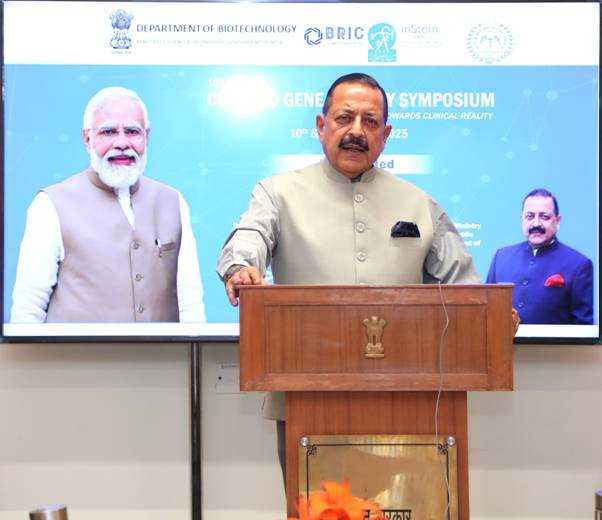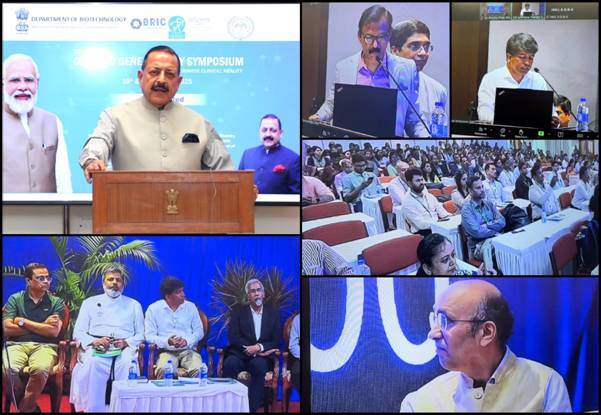Ministry of Science & Technology
Dr. Jitendra Singh inaugurates at the Christian Medical College (CMC), Vellore, the 10th Annual "Cell and Gene Therapy" Symposium organised by the Centre for Stem Cell Research (CSCR), supported by the Department of Biotechnology, Govt of India.
Dr. Jitendra Singh lauds the landmark achievement of CSCR, CMC Vellore, which recently completed India’s first-in-human gene therapy trial for Hemophilia A
Union Minister Says, not just a scientific milestone—it is a transformative step toward affordable, accessible gene therapy for India and other low- and middle-income countries:
Highlighting the milestones of the Department of Biotechnology over the last one decade of the Modi Government, Dr Jitendra Singh cites biomanufacturing in which, India today stands at Rank 3 in Asia-Pacific and Rank 12 globally, says the Minister
Posted On:
10 OCT 2025 6:22PM by PIB Delhi
Union Minister of Science and Technology Dr. Jitendra Singh today virtually inaugurated at the Christian Medical College (CMC), Vellore, the 10th Annual "Cell and Gene Therapy" Symposium organised by the Centre for Stem Cell Research (CSCR), supported by the Department of Biotechnology, Govt of India.
The Union Minister also inaugurated a new 42-bed Medium-Cost Private Ward in the Department of Psychiatry.
Dr. Jitendra Singh lauded the landmark achievement of CSCR, which recently completed India’s first-in-human gene therapy trial for Hemophilia A. The inherited bleeding disorder, caused by the deficiency of clotting Factor VIII, has long required costly lifelong treatment. CSCR’s approach, using lentiviral vectors instead of the commonly used AAV, expanded patient eligibility and showed sustained Factor VIII expression with no bleeding episodes.
“This is not just a scientific milestone—it is a transformative step toward affordable, accessible gene therapy for India and other low- and middle-income countries,” Dr. Jitendra Singh said.
The Minister noted that CSCR, a translational unit of in Stem, Bengaluru, under the Department of Biotechnology (DBT), is preparing for the next phase of clinical development. “Several technologies for hemoglobinopathies are being transferred to commercial partners, and CSCR is building a GMP-compliant haplobank of iPSCs as part of the Global Alliance for iPSC Therapies,” he added.
Dr. Jitendra Singh said, the new psychiatry ward strengthens CMC’s legacy of mental health care, which dates back to the 1950s. The medium-cost facility has been designed to serve patients across socioeconomic groups. “The Department of Psychiatry already runs three key wards — the fully subsidised Annexe Ward, the partly subsidised Low-Cost Private Ward, and the Private Ward whose revenues sustain the others. But many of the private ward rooms, built in the 1950s, are now structurally outdated. This new ward responds to that need, adding 42 beds that meet modern safety standards and provide the highest quality of psychiatric care,” he said.
The Minister emphasised that the ward balances affordability with excellence. “By fostering a nurturing environment that encourages family participation in the healing process, this facility will elevate patient care while also ensuring subsidised treatment for underprivileged communities,” he added.
Placing these developments in the national context, Dr. Jitendra Singh said, in biomanufacturing India today stands at Rank 3 in Asia-Pacific and Rank 12 globally, while pharma exports expected to cross 300 billion USD by the turn of this year.
India’s bioeconomy has grown from $10 billion in 2014 to nearly $170 billion today, said Dr Jitendra Singh, and is projected to reach $300 billion by 2030. Pharma exports are valued at $27.8 billion, set to cross $30 billion this year, while the medical technology sector, currently at $12 billion, is growing at 15–20% annually and expected to touch $50 billion by 2030. He also pointed out that the number of biotech startups has risen from just 50 in 2014 to over 11,000 today.
Dr. Jitendra Singh underscored that India’s innovation ecosystem is being strengthened by policies and programmes such as the BioE3 policy, BIRAC’s public–private model, the National Research Foundation with 70% non-government funding, and a ₹1 lakh crore R&D fund to support private sector participation. He said Gross Expenditure on R&D has doubled from ₹60,000 crore to ₹1,27,000 crore, while the DBT budget has risen from ₹1,500 crore to nearly ₹7,000 crore, with over 55% of patents now filed by Indian residents.
Highlighting DBT’s contributions, the Minister cited vaccine breakthroughs such as the world’s first DNA vaccine for COVID, the HPV vaccine, and the development of the antibiotic Nephetrovacine, as examples of India’s growing role as a frontrunner in biotechnology.
Concluding, Dr. Jitendra Singh said the two inaugurations reflect India’s twin focus on expanding affordable mental health services and advancing cutting-edge scientific innovation. “Affordable, accessible, and quality healthcare, whether physical or mental, is essential for building a self-reliant India. The achievements at CMC and CSCR exemplify how our institutions are driving innovation to meet the aspirations of India@2047,” he said.


******
NKR
(Release ID: 2177462)
Visitor Counter : 1025